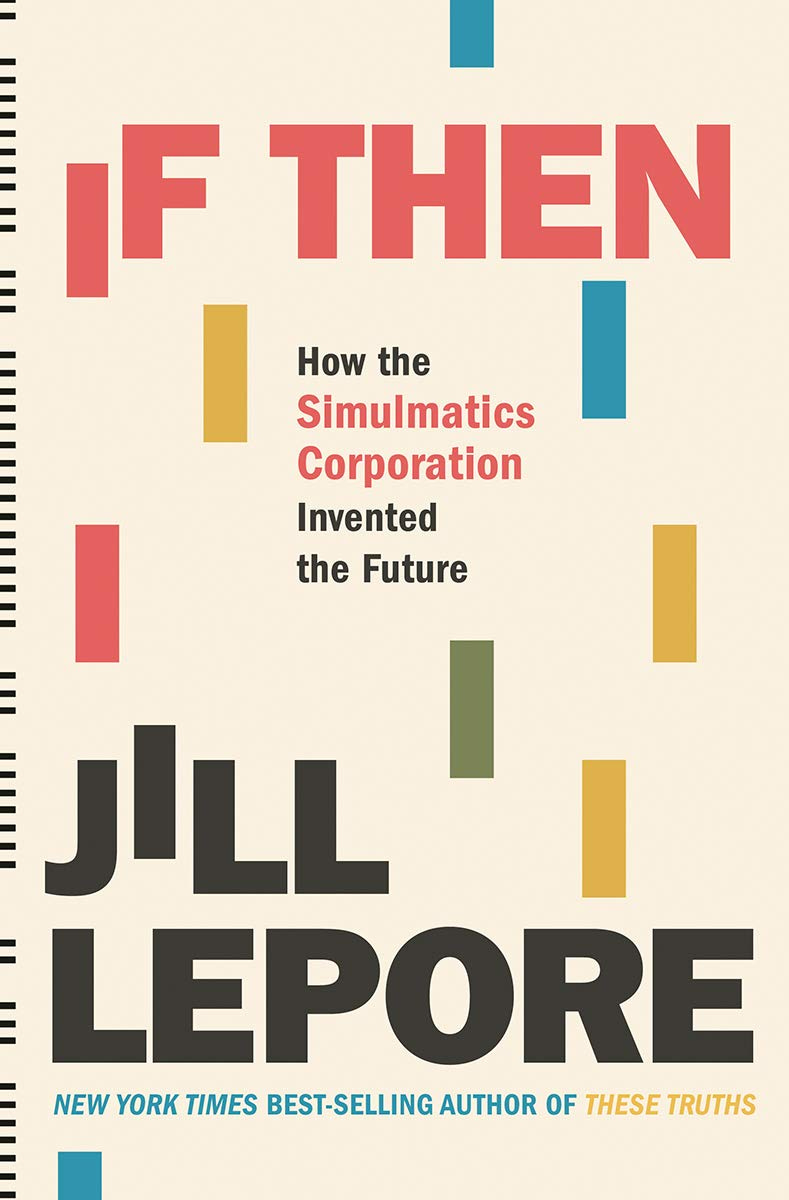Sunday Snapshots (01/03/20) – If Then, China's 2020, and Amazon's Anti-trust Problems
In which I write the first issue of 2021
Hey everyone,
Greetings from Washington, D.C.!
Welcome to the very first Snapshots of 2021.
The last time I wrote one of these start-of-the-year issues, I was on a transcontinental flight. Those are a distant memory, but I guess the experience of being stuck in your apartment in the middle of a pandemic is not all that different from those 19 hour journeys: The outside is cold and dangerous. Even the more-generous-than-domestic-flights legroom can start to feel cramped after a while. You can even get food delivered right to your table!
We’ll probably be up in the air at some point this year and get to relive all those luxuries. In the meantime, if you’re looking for some recommendations for those 2021 reading lists, here were my favorite books in 2020:
If you end up reading any of these, please let me know – it would make my day.
In this issue of Snapshots, I want to explore:
If Then by Jill Lepore
Dan Wang’s 2020 Annual letter
How AmazonBasics leads to anti-trust problems for the company
SEO madness, Craig Mod, and the disconnect between the stock market and the economy
Book of the week
A couple of months ago, If Then by Jill Lepore came as a recommendation out of one of those archetypical friendships from boarding school that transcend continents, cultures, and contexts. My friend suggested that I would enjoy reading it since it was at the intersection of my interests.
That was an understatement.
After World War 2, the earliest generations of computers were set to revolutionize all industries. But the teeth of the data revolution were cut against the two most industries of all – the military and politics. The Simulmatics Corporation focused on the latter.
Political strategy? Check. Company biography? Check. The clash of personalities? Check. Presidential intrigue? Check. It would be tough to find a book that hits the bulls-eye of my concentric circles of interests with more accuracy.
If you expect a story of arcane technical details about data-driven decision making, then you’ll be disappointed. It’s about how events in history converge to give birth to a new way of thinking.
If you expect a story about the men responsible for creating the spiritual precursor to Cambridge Analytica and other political consulting firms, then you’ll be disappointed.
If you expect a story of how American democracy was changed forever by the advances in targeted predictions about specific ethnic and demographic populations, then you’ll feel right at home.
Jill Lepore’s writing stands out as she does a much better job than me of putting sequence of ideas together. Here are some passages that stood out:
In a final irony, Simulmatics, whose very past has been all but erased, helped invent a future obsessed with the future, and yet unable to improve it.
The first computer most Americans ever saw was an empty shell: a stunt.
They were midcentury white liberals in an era when white liberals were not expected to understand people who weren’t white or liberal. They were husbands and fathers in an age when men were not expected to understand women and children. By “human behavior,” they meant the behavior of men; by “artificial intelligence,” they meant their own intelligence – a fantasy of their own intelligence – which they intended to graft onto a machine.
I’m about 200 pages into the book and while I have enjoyed it, I don’t feel quite ready to share my thoughts – mostly because despite trying to summarize them for the past couple of hours, I’ve been unsuccessful in formulating sequences of ideas that do it justice. So more on that next week.
Long read of the week
Dan Wang is my favorite China thinker so it shouldn’t come as a surprise that his annual letters are a permanent fixture on the first issue of Snapshots every year (see 2019).
This year, Dan expertly threads the needle across the Communist party’s bi-monthly journal, its suppression of dissidents, and the impact of US sanctions on technological innovation in the country.
What’s most interesting to me is the now widely accepted China hawkish-ness amongst elites. That sentiment and a heavy-handed national security policy over the last few years has led to a serious of sanctions against Chinese firms that provide key technologies to a wide variety of industries, most importantly the electronics sector. These sanctions not only cut off access to the US market for these Chinese firms, but also prevented US suppliers from doing business with them. This means cutting off access to an evolving market that decreases not just revenues and profits, but process knowledge. It is also a signal for customers of these companies in China and abroad that they are unreliable suppliers. The bet that this will stymy the efforts of the Chinese government to achieve dominance in key technologies is a shaky one at best. Dan’s assessment is that it will probably accelerate this.
Perhaps the hardest point for any naive “Chinese is bad, Western society is good” opinion holder is this:
In any case, the Chinese ban of Facebook today looks like a prescient action, given how much the company’s activities have enraged western governments, who complain about the circulation of conspiracy theories and other misinformation on social media platforms. It’s harder to argue that China was foolish to ban products so wondrous that their CEOs need to be hauled on a regular basis before political leaders to endure demands to fix the social problems their platforms are allegedly amplifying.
Oof. That’s a tough one to rebut.
Like one commenter on Dan’s blog post observes, the letter does a great job of describing “what’s happening “in” China, as opposed to “by” or “to” China.” I highly recommend you read it.
Business move of the week
Amazon Will Regret Building Private Label Brands
Something a bit different this week. Let’s talk about a move that should not have been been made.
This article argues that private labels are just not worth the anti-trust hassle for Amazon given they are only 1% of company sales (and likely not that much higher percentage of profits.)
I’ve covered the famous Amazon’s Anti-Trust Paradox paper by Lina Khan on Snapshots before (see my annotated copy here.) Here was my summary of the AmazonBasics section:
It’s no secret that Amazon uses data from its marketplace and creates private label versions for popular and profitable products under the AmazonBasics umbrella. While private labels are not a new phenomenon, Lina argues that “the difference with Amazon is the scale and sophistication of the data it collects. Whereas brick-and-mortar stores are generally only able to collect information on actual sales, Amazon tracks what shoppers are searching for but cannot find, as well as which products they repeatedly return to, what they keep in their shopping basket, and what their mouse hovers over on the screen.” A difference in quantity becomes a difference in quality. It sheds typically risks associated with innovating by leveraging its marketplace data and reaps the benefits of it. This limits the ability of firms to innovate because any potential profits are eliminated by Amazon.
The problem with this interpretation is that the current focus of anti-trust laws in the US focus on outcomes and not structures. From the same summary:
Lina’s overarching critique is that the current antitrust laws focuses too much on outcomes like lower prices versus maintaining a competitive industry structure. It’s based on markets with non-zero marginal costs with weak network effects – the opposite of the dominant companies today. These characteristics make the historic interpretation of predatory pricing and vertical mergers outdated.
She argues for a more structure-oriented approach which looks out for the influence that a company exerts on the whole ecosystem of an industry. She isn’t worried about companies behaving badly, she wants to ensure they never get the opportunity to do so in the first place.
If some of these ideas sound familiar to you from the summer of congressional hearings with tech CEOs, that isn’t a coincidence. From Lina’s website:
Khan served as counsel to the U.S. House Judiciary Committee’s Subcommittee on Antitrust, Commercial, and Administrative Law, where she led the congressional investigation into digital markets and the publication of its final report.
I’m curious to hear your thoughts here. Should AmazonBasics not be allowed? Should Amazon have started it in the first place? Will it eventually become a substantial percentage of the company’s revenues?
Odds and ends of the week
A reading heavy section this week:
🍰 Why Google’s recipe ratings are meaningless: Inside the insidious world of SEO manipulation through the lens of recipes. A good primer to last week’s Subprime Attention Crisis section.
🇯🇵 The Liminality of Craig Mod: In 2020, I found Craig’s work and he has turned into probably my favorite internet creator. In 2021, I found out what the word “liminality” means. I’m not quite sure what that means for 2021. But read this article as an introduction to the incredible body of work he has produced over the years.
📈 Why Markets Boomed in a Year of Human Misery: Is it confusing that stock markets around the world hit all-time highs despite the economy being in shambles? Once again, the NYT digital team exceeds all expectations in this must-read for anyone who follows the markets.
That wraps up this week’s newsletter. You can check out the previous issues here.
If you want to discuss any of the ideas mentioned above or have any books/papers/links you think would be interesting to share on a future edition of Sunday Snapshots, please reach out to me by replying to this email or sending me a direct message on Twitter at @sidharthajha.
Until next Sunday,
Sid


